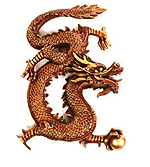A number of interesting legends and myths are tied in to the Dragon Boat Festival, as is the case with any other festival of the world. A part of Chinese folklore, these mythic tales are integrally related to the Chinese culture and popular Chinese imagination. Go through the popular legends and myth associated to the Dragon Boat Festival and click here to let your dear ones know about these too. Celebrate "Duan Wu" with TheHolidaySpot.
The highly popular Chinese Dragon Boat Festival or "Duan Wu Jie" is held on the fifth day of the fifth month of the Chinese Lunar calendar. Traditionally, this is a time for high celebration for the Chinese community all over the world. In China, it is a time for grand feasts and exuberant festivities.
But this wonderful festival and its origin is believed to be wrapped in dark legends and attended with mythical and supernatural suggestions. The reason is not hard to seek. In Chinese belief, the fifth month of the Chinese lunar calendar is supposed to be an inauspicious one, a month fraught with danger. As the famous boat festival is held during this fifth month, it is natural that the origin of the occasion is associated with dark legends and myths.
As per one such legend, the tradition of dragon boat racing began as a way to appease the River Dragon, the Chinese God of Water. Dragons are symbolic of good fortune in Chinese tradition and celestial dragons were thought of in ancient days as the controllers of the rain, the Monsoon winds and the clouds. Primitive Chinese people viewed the dragon as the benevolent spirit of the waters. To them, the dragon stood for the masculine principle or "yang" in the Chinese ideology of harmony. Hence the ancient Chinese, most of whom were involved in agriculture and highly dependent on the weather for their livelihood, worshipped the dragon during the Summer Solstice with requests for a balanced rainfall. The boat festival has always been held during the same period, after the spring planting, when people had time to relax and needed rain for their crops. The race of the dragon-shaped boats during this festival represented a real dragon fight in the heavens, and was meant to appease the Dragon deity to avert misfortune and calamity and bring in rainfall to the earth which is always necessary for the fertility of the crops and thus ensure the prosperity of the agrarian way of life.

According to another legend, a deadly plague led the ancient Chinese to hold boat races to pay a homage to the River Dragon so that it would protect them from its ravages. This is also believed to be a reason behind the origin of the custom of dragon boat racing.
However, the erudite Chinese scholar and poet Professor Wen Yiduo (1899 – 1946) theorised that the Double Fifth celebrations were originally held to celebrate the birthday of the dragon, which according to a traditional Chinese belief, falls during the period of Summer Solstice (which is also the time of observance of the Dragon Boat Festival). He indicated that the close association of the festival with dragon may be due to the fact that two of the most important activities of the festival, dragon boat racing and eating zongzi, are related to dragon.
According to another legend associated with the the Double Fifth day and popularly believed in ancient times, a child born on this date was to be extremely difficult to bring up, causing much grief to his/her parents. The famous tale of Tian Wen well supports this legend. Tian Wen was born on the Double Fifth day and hence, was always looked at with contempt and almost ostracized. In his lifetime, Wen had to go through several traumatic incidents that left him emotionally scarred. Wen even survived murder attempts and banishment by his father. But he grew up to make a name for himself and went on to eventually become the Prime Minister of a Chinese state. Determined that no other child should suffer the same fate as himself, Tian Wen ordered across the state to consider the Double Fifth day as a regular day, as auspicious as any other. He even encouraged joyous celebrations on this day and the custom of boat racing is thus said to have started - as a part of these festivities. With time, the tradition became the essence of the Double Fifth celebrations and the occasion began to be known as the Chinese Boat Festival.
Tian Wen's noble attempts slowly bore fruit as the supposed supernatural origins of the Double Fifth day gradually began to be obliterated from the minds of the people, thus eliminating all associations of it with the dark powers that was believed to hold sway over it. For a long time, however, the fifth month of the Chinese lunar calendar was designated as the "Evil Month" and was believed to be the time when evil sprits ruled over unfortunate humans.
Looking for Something? Search Google :